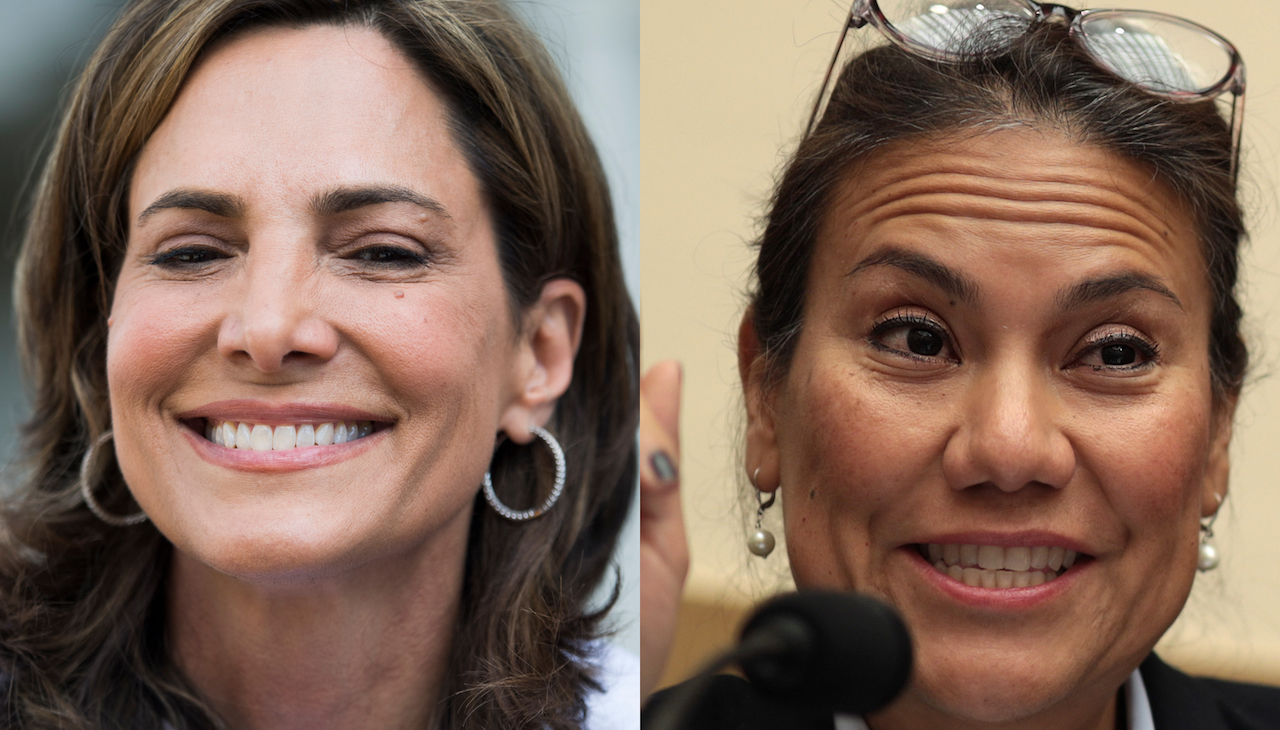
Latina Congresswomen María Elvira Salazar and Veronica Escobar introduce the bipartisan “Dignity Act” in hopes of U.S. immigration reform
On the steps of Capitol Hill on Tuesday, May 23, two Latina congresswomen introduced the The Dignity Act, a bipartisan immigration bill that creates a 12-year, two-part path to legal status and would require the border first be declared secure before anyone on the path is granted legal status. It also includes more investment in border security, among other measures.
Florida Rep. María Elvira Salazar (R) unveiled the updated version of her 2021 Dignity Act bill that was introduced in her first year in Congress. This latest version carries harsher guidelines and is co-sponsored by Texas Democratic Rep. Veronica Escobar (D).
The bill is the first serious bipartisan immigration solution introduced by Congress in over a decade, according to Salazar.
“This is a historical moment. Two members of Congress — one Democrat, one Republican — decided to work on one of the most divisive topics in this country: immigration. Who wants to do that? Very few people,” Salazar said.
Original cosponsors include Reps. Jenniffer Gonzalez-Colon (R-PR), Hillary Scholten (D-MI), Lori Chavez-DeRemer (R-OR), Kathy Manning (D-NC), and Mike Lawler (R-NY).
According to Salazar’s press release, the bill is focused on four main components:
Stopping illegal immigration; providing a dignified solution for undocumented immigrants living in America; strengthening the American workforce and economy; and ensuring the United States remains prosperous and competitive in the future.
The updated bill would allow undocumented migrants to work and safeguards them from deportation. It would speed up the asylum process and detain asylum-seekers who enter the U.S. through the southern border at one of five “humanitarian campuses,” where they will be detained until their case is decided.
It would also dock the pay of those without permanent legal status to fund border infrastructure.
Salazar, a Cuban American lawmaker, told the media that the billlooks to "bring dignity" to Border Patrol agents who according to her are "overworked and underpaid," to the business community in need of workers, and to the millions and millions of people "who are invisible to most Americans, who are doing the jobs others are unwilling to do."
“Communities like my own in El Paso, Texas, communities along the southern border and now even communities far away from the southern border have some impact from congressional inaction,” added Escobar, who is Mexican American.
Salazar made sure to emphasize that her updated bill is not the same as the amnesty law signed by former President Ronald Reagan in 1986 that gave over 3 million their citizenship — including colleague and Democratic Rep. Robert Garcia — as this bill carries higher penalties compared to that of the Republican border security bill approved by the House on May 11.
"I don't want anyone to confuse amnesty with dignity," Salazar said. "This is not amnesty. Amnesty is what the undocumented have right now and have had for 30 years. Free roads, free schools and free hospitals. In the Dignity Law, everyone pays for their ride."
The bill is an overhaul effort to change how immigrants are treated when arriving in the U.S., and Escobar called out Congress’ inaction on creating a comprehensive immigration reform bill.
“Decades of congressional inaction on immigration law has real consequences, and the humanitarian crisis unfolding before our eyes requires a bipartisan solution,” said Escobar.
CONTENIDO RELACIONADO
“With the introduction of this legislation that Representative Salazar and I have been working on since December 2022, it is our hope that Congress seizes the opportunity to solve the immigration challenges of today and tomorrow,” she added.
Some of the provisions of the Salazar-Escobar bill:
- Provides $25 billion to fully secure the border.
- Mandates 100% nationwide E-verify to ensure all American businesses are hiring legal workers.
- Achieves operational control and advantage of the Southern Border by employing a comprehensive Southern Border Strategy.
- Constructs enhanced physical barriers and deploys the most up-to-date technology at the border.
- Hires thousands of new Border Patrol agents, CBP officers, and border intelligence units.
- Implements new policies to stop criminals crossing the border illegally, including new authorities to track cartel spotters, and raises penalties on human traffickers and child sex traffickers.
- Authorizes DHS to officially designate an organization as a criminal street gang, making any alien involved in a criminal gang inadmissible and deportable.
- Provides DHS the authority to use DNA testing to verify family relationships.
- Enhances port-of-entry security by expanding surveillance and intrusion detection system.










DEJE UN COMENTARIO:
¡Únete a la discusión! Deja un comentario.